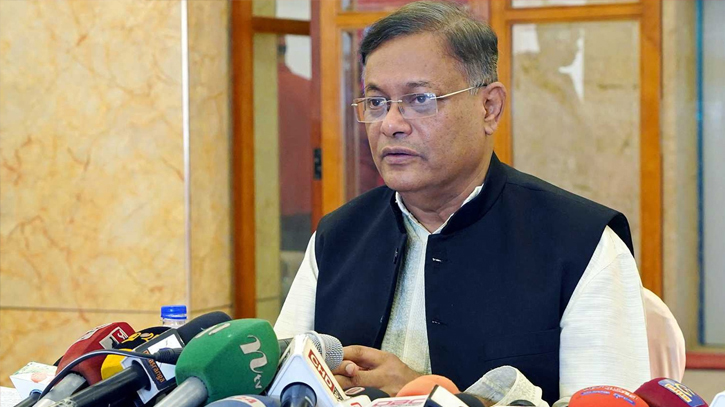
Photo: Collected
Foreign Minister Hasan Mahmud on Tuesday (7 May) said Bangladesh will not only continue to act upon the pledges it has made for its domestic context but would also take up emerging issues and challenges pertaining to migration and development for informed deliberations at the international level.
"Bangladesh remained active in the formulation of the Compact, in developing the modalities for its implementation review, and also in steering its first review process," he said while speaking at the launching ceremony of the World Migration Report (WMR) 2024 as the chief guest.
IOM Director-General Amy Pope, Chief of Mission of the International Organization for Migration (IOM) in Bangladesh Abdusattor Esoev, EU Ambassador to Bangladesh Charles Whiteley and former Foreign Secretary Shahidul Haque, among others, spoke.
Hasan said it was Prime Minister Sheikh Hasina who first the mooted the idea of the Global Migration Compact during her address to the UN General Assembly in 2016.
The WMR 2024 makes a compelling case about ever growing number of forced displacements due to conflicts and violence, said the Minister.
The mass atrocities being committed in the Gaza Strip by the occupying Israeli forces, violating international norms of selectivity or proportionality, are an affront to our shared humanity, he said.
"In our immediate neighbourhood, the increasingly complex security situation in Myanmar has led to resurgence in mixed migratory movements across borders," Hasan said.
This is causing unwarranted delay in the much-awaited repatriation of the 1.3 million Rohingya now sheltered in Bangladesh, aggravating their sense of frustration and internecine conflicts, he observed.
The WMR 2024 acknowledges the centrality of the Global Compact on Safe, Orderly and Regular Migration (GCM) in migration governance, not least for its 360° approach to migration.
The Foreign Minister shared five major take-away from the report from Bangladesh perspective.
First, he said, the actual number of international migrants remains below 400 million, constituting only 3.6% of the human population.
Female migrants comprise 48% of the people on the move across borders.
Most people, however, choose to live within their national borders, and most migration trends are safe, orderly and regular.
These facts deserve to be highlighted again and again to dispel or disprove the negative, xenophobic impression about migration propagated by certain vested quarters.
Second, Hasan said, the regular pathways for international migration are getting narrowed down for developing countries, while they keep broadening for developed countries.
This does not correlate with the demand-side of labour markets in many advanced economies with ageing societies or skill shortages.
Such evident mismatch thus creates incentives for transnational organised criminal networks to thrive on migrants’ smuggling at a staggering cost of human lives.
"We would urge IOM along with its partners to keep exploring possibilities for widening legal migration pathways in parallel with its current preoccupation with return of migrants from certain destination or transit countries," he said.
Third, the Minister said the importance of migration as a vehicle for sustainable development is reinforced by the fact that international remittance flow has grown by 650% in the last 24 years.
Most notably, the volume of remittances has outstripped that of both Official Development Assistance (ODA) and Foreign Direct Investment (FDI) from developed to developing countries.
"It is, therefore, of utmost importance to facilitate remittance flow through official channels to maximise its development impact," he said, adding that effective solutions are needed to address visa trading, debt entrapment, underemployment, wage theft and other practices adversely affecting migrant workers.
Fourth, the Foreign Minister said, the need for viewing migration from a human security lens is getting more pronounced than ever before.
The acute vulnerabilities experienced by migrants stranded at borders, deported to and detained in offshore locations, or left to perish without search and rescue efforts at seas are the brazen manifestations of policy responses that perpetuate systematic abuses and discriminations against migrants.
"It is rather ironic that most international human rights actors prefer to remain silent on the need for ratification of the International Convention on the Rights of Migrant Workers and their Families by major destination countries," he said.
Fifth, the compounded effects of humanitarian crises, health emergencies, climate change and digital transformation on human mobility are likely to reshape global migratory trends in fundamental ways, Hasan said.
Whilst most of the movements would perhaps occur internally, some forms of displacements are bound to have cross-border implications.
"It would be worth considering that the digital tools used in immigration procedures do not disproportionately affect people on the move from developing and least developed countries," he said.
Messenger/Mumu








